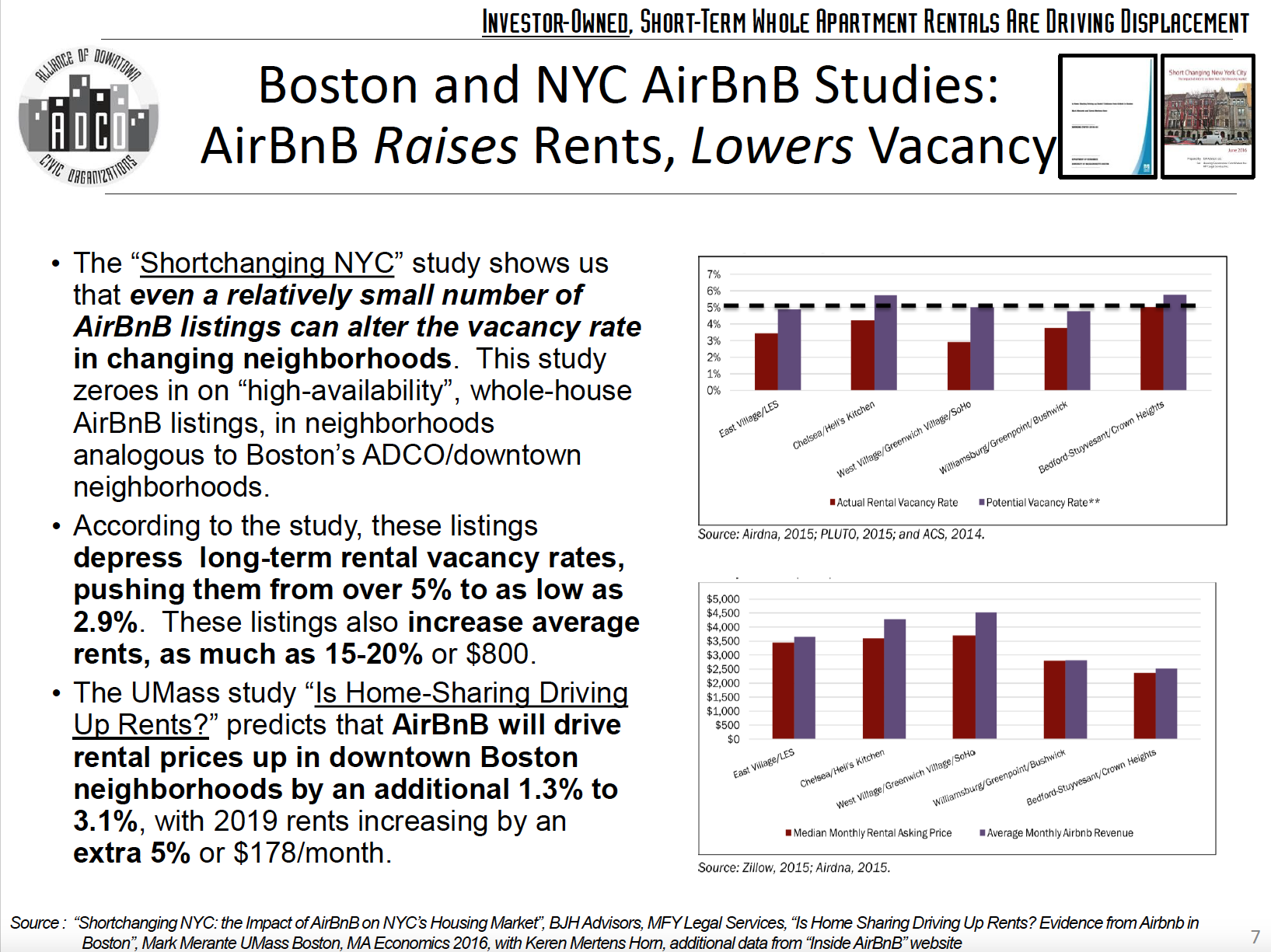The Alliance of Downtown Civic Organizations (ADCO) has released a report suggesting several changes to the Mayor’s proposed regulations of short-term rentals, most notably the elimination of investor-owned units.
As you may recall, the proposed ordinance would set a 90-day limit for residential units rented on sites like AirBnB. The fee structure would separate short-term rentals into three tiers, with the third tier, “investor unit”, paying $500 per year. The ADCO says this is not enough, calling for a ban on all investor-controlled AirBnB-type units in Boston.
Video: Discussion of proposal to regulate short-term rentals at North End / Waterfront Residents’ Association (NEWRA) by VP David Goggins. State Rep. Aaron Michlewitz also spoke at this meeting (15:25 in video).
The ADCO notes that 60% of Boston’s entire home/apartment listings are investor units, 70% in the downtown/ADCO neighborhoods. This makes Boston’s investor ownership three to four times higher than other major cities including San Francisco, D.C., and New York. Several studies have shown this will lead to long-term resident displacement and rent increases. ADCO’s study urges Boston to follow the example of cities such as Portland, San Francisco, Los Angeles, Nashville and Berlin – all with lower investor ownership than Boston – to ban investor units entirely.
Chairman of ADCO Ford Cavallari said about the proposed ordinance:
The Mayor’s proposed ordinance has many laudable attributes and is most certainly a step in the right direction. Many good, hard-working Boston residents are using AirBnB to help make the rent or pay the mortgage. This ordinance, however, overlooks the serious difference between residential owners listing their units short-term, and professional investors and speculators looking to exploit our market. Boston residents should be treated differently than investors, but they are treated exactly the same in the proposed ordinance. This needs to change.
Here are some other statistics from the ADCO study:
- 62% of Boston AirBnB listings are for entire homes/apartments, 85% in the downtown/ADCO neighborhoods.
- Boston-wide, multi-unit AirBnB listers (aka investors) make up only 7% of owners/listers but their units make up more 60% Boston’s whole apartment AirBnB inventory.
- In Boston’s downtown/ADCO footprint, only 2% of owner/listers account for almost 40% of the whole apartment AirBnB inventory.
Video: Ford Cavallari presents the ADCO’s recommendations for City Council at the February North End / Waterfront Neighborhood Council meeting. Ford discusses safety standards (3:11), multi-unit ownerships (4:29), increasing rents (10:07), and real estate speculators (11:01).
See the ADCO’s full presentation, “The Mayor’s Ordinance to Regulate Short-Term Rentals: Priority Fixes Needed”, posted below. There will be a public hearing on this ordinance tomorrow, February 13, at 10am at City Hall.
See more NorthEndWaterfront.com coverage on short-term rentals by searching the tag: short-term rentals
















Great job with details and facts. Thank you, Carmel
The maintenance and compliance/enforcement of these measures should not be an additional burden on taxpayers. Therefore come up with the cost of registration and enforcement, then revisit the registrstion fees to see that they are sufficient to cover costs.
Also, I am not certain who performs the registration, the owner or the rentsl collector(e.g., AirBnB)?
From reading this, I’m not fully clear what it means for the owner of a 3-family? I live in the top unit. Will I be limited to renting Units #1 and #2 to just 90 days? Thanks for any help clarifying.
I think this applies to short-term rentals. I am assuming that you rent for the long term for people who are residential tentants.
After seeing that big street log,it might be good to add a rule that prohibits pets. I don’t think the neighborhood can stand more transient dog walkers.